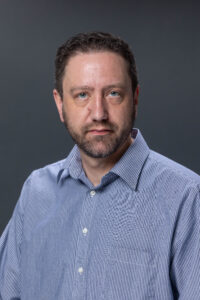Lessons in leadership from life of a doctor
Dr. Joshua Wynne speaks of leadership lessons learned from a career in medicine

Editor’s note: A video of dean of the UND School of Medicine & Health Sciences Dr. Joshua Wynne’s 18:83 Speaker Series talk is available at the bottom of this story.
****
When physicians use clinical observations to draw general conclusions, they’re using inductive reasoning. Inductive reasoning also can be used to extrapolate rules, principles or even wisdom from particular experiences.
And at the bottom of the Social Stairs in the Memorial Union on Wednesday, March 13, inductive reasoning was on high display. That was where Dr. Joshua Wynne, dean of UND’s School of Medicine & Health Sciences, stood before a gathering of UND students, faculty and staff members, and derived principles of leadership from lessons from his life as part of UND’s 18:83 Speaker Series.
Wynne began his talk by telling the crowd what he was not going to do.
“What I’m not going to do is to show any slides; what I’m not going to do is to give a lecture,” he said. “What I am planning on doing is to tell you a number of stories that have occurred in my professional life that I think have helped shaped me, in some ways, for what I’m doing today.”
The first principle Wynne spoke about was the importance of speaking up, and not remaining silent when in a difficult situation. It was a lesson he learned when he was an intern at the Peter Bent Brigham Hospital (now Mass General Brigham), a hospital associated with Harvard Medical School in Boston.
Underscoring its importance, Wynne said this was only the second time he’d ever told this particular story.
One of 14 interns or first-year residents in the program then, he and his colleagues were tasked with being on call for patients every other night. For months. To say it was exhausting would have been an understatement.
“I hit the wall,” Wynne said. So, one night he walked out of the hospital.
As he walked away, the clouds parted and the moon shone on the coronary care unit of the hospital (Wynne is a cardiologist). Maybe it was a sign, maybe it wasn’t, but it persuaded him to return to his duties. He also learned from that experience a lesson in life, as much as in leadership.
“Burnout is real,” he said. “I certainly was burned out, but I didn’t say a word. The thing I’ve learned is it’s better to say something rather than keep it quiet.”
Wynne would touch again on those late-night on-call shifts at the end of his talk.
Another lesson involved a teacher at that same hospital changing the medication of a patient under Wynne’s care — without telling Wynne. It was part of the organizational culture there that interns had to know everything about their patients, but that’s hard to do when one isn’t told of changes.
He decided to speak to this attending physician about the situation, which was no easy matter (Wynne said this individual doctor should have won a Nobel Prize for their work).
Surprisingly, Wynne wasn’t berated for being the upstart intern calling out an established attending physician. In fact, this person apologized and said such an occurrence wouldn’t happen again. The attending physician subsequently endorsed the idea of keeping interns in the loop on patient care. The doctor took action on the matter.
From this, Wynne said he learned that an organization is not what it says, it’s what it does.

Regarding this same attending physician (whom Wynne idolized), he said he learned the important lesson of trusting one’s team.
That principle was gleaned after this same physician was brought to Peter Bent Brigham Hospital after suffering a heart attack. A complication developed after initial treatment, meaning this person essentially died, and cardiopulmonary resuscitation was started. Wynne wanted them to stop. To let him go.
The team didn’t relent, and they rushed the doctor into the operating room, performing bypasses by feel as needed, and without first carrying out additional assessment to locate the blockages. The surgery worked, the doctor survived and even returned eventually to work, albeit with a minor cognitive impairment (meaning, Wynne joked, he went from a genius-level IQ to being “merely very smart”).
“What was the takeaway that I took from this experience?” Wynne asked the crowd. “It’s trust your team.”
And there were other lessons along the way, such as suspending one’s preconceived notions of a subject and keeping an open mind. But Wynne, in closing his speech, returned to the topic of those all-night, every-other-night on-call shifts from his intern days, and how it’s necessary to act as the instrument of change in a bad situation.
At the Peter Bent Brigham Hospital, a new chairman of medicine came on the job. He asked what changes were needed in the internal medicine residency.
Speaking as one, the 14 interns of which Wynne was a part said to get rid of the every-other-night call.
Responded the chairman: “Done.”
The 18:83 Speaker Series continues Wednesday March 20, with Rebecca Bichel, UND Dean of Libraries.



